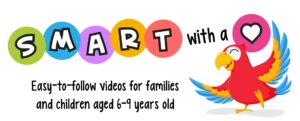The online world is rapidly developing and many of our children now have access to devices which enable them to connect to the internet, take images or video and communicate with others. While it is important not to obstruct them from developing skills using these devices, it is essential that we support our children in understanding how to keep themselves safe when doing so. This is a key part of both our Computing and PSHCE curriculum.
Childnet have videos and presentations to watch and look at with your child and can be found using the links below.
 |
 |
| Smartie the Penguin for children aged 3 to 7 years | SMART for children aged 6 to 9 years old |
The best way to help your child to be safe when using the internet and new technologies is to talk to them and make sure they understand these simple rules:
- You should never give out personal details to anyone online. Use a nickname when logging on and don’t share full name, email address, mobile number, school name and any photos, including photos of family or friends – any picture or video online can be changed or shared without permission.
- Talk to your child about what they are doing online and who they are talking to. Get them to show you how to use things you are not familiar with. Keeping the computer in a family room means that you can share your child’s online experience, they are less likely to act inappropriately (i.e. via webcam) and their online ‘friends’ will see they are in a family room.
- If your child receives a message that upsets them, remind them not to reply, they should save the message and show you or another trusted adult.
- Spam and junk emails and texts are not true, don’t reply or send them to anyone else, just delete them.
- Don’t open files sent from people you don’t know. They could contain a virus, or worse – an inappropriate image or film.
- An online ‘friend’ is anyone you have not met in real life; no matter how long you have been friends with them.
- Help your child to understand that some people lie online and that it’s better to keep online ‘friends’ online. They should never meet up with any online ’friends’ without an adult they trust.
- Make sure they know how to block someone online and report them if they feel uncomfortable.
- Make sure your child feels able to talk to you, let them know that it’s never too late to tell someone if something makes them feel uncomfortable. Don’t blame your child, let them know you trust them.
For parents and carers, keeping up to speed with what your child is doing online can feel like a daunting task. There is a lot of support out there to help you to help your child keep themselves safe. Below are a number of links that may be helpful. Our school staff will also offer support and advice where appropriate so please do just come and ask if you need some help.
O2 support – https://www.o2.co.uk/help/nspcc
ChildNet – https://www.childnet.com/
UK Safer Internet Centre – https://www.saferinternet.org.uk/
https://www.safeguardingchildren.co.uk/parents-carers/
It is important to remember that the legal age to have an account on most social media, including Instagram, Facebook, Youtube and Snapchat, is 13 years old.